|
Getting your Trinity Audio player ready...
|
High-quality data and robust statistical analysis can make all the difference in the kind of journal your research gets published in. It’s not surprising that researchers are choosing to set aside a portion of their research budget to secure professional statistical support. But when it comes to choosing a professional statistical analysis service for your biomedical research project, price and quality aren’t the only factors to consider. You want to make sure you’re getting the best support and expertise available that meets your specific needs, not just for data analysis but for your publication goals too. Here are 5 things you need to consider when you choose a professional statistical analysis service.
- Data Security and Confidentiality: Biomedical research often involves sensitive and confidential data, such as patient information or proprietary data. It is crucial to choose a statistical analysis service that prioritizes data security and confidentiality. Ensure that the service provider has robust security measures in place, such as secure data transfer protocols, encryption methods, and adherence to relevant data protection regulations.
- Flexibility and Customization: Biomedical research projects can have unique requirements and complexities. For instance, you might find an unusually poor treatment response in a specific subgroup, which warrants further analysis. Look for a service provider that can offer flexible and customizable analysis solutions tailored to your specific needs. They should be willing to collaborate closely with you, understand your research objectives, and adapt their analysis methods accordingly.
- One-on-one Support: 1:1 support from a biostatistician is crucial for a biomedical researcher because it provides personalized and specialized guidance throughout the statistical analysis process. By collaborating closely with a biostatistician, you can enhance the accuracy and reliability of your analyses, gain a deeper understanding of statistical concepts, and derive meaningful insights from your data.
- Long-Term Support: Even after the study is completed, it can take several months for the manuscript to get written, submitted to a journal, peer reviewed, and finally published. Look for a statistical service that is willing to assist you throughout the manuscript preparation and publication process, including helping you respond to statistics-related peer review comments.
- Software and Tools: Evaluate the service provider’s proficiency in using relevant statistical software and tools commonly used in biomedical research, such as SPSS, R, MATLAB, and STATA. Check if they have access to the necessary licenses and resources for conducting the analysis efficiently. Additionally, inquire about their ability to handle large datasets or specialized data types (e.g., omics data).
Looking for professional biostatisticians who can provide customized support for your research projects? You don’t need to look further than Editage’s Statistical Analysis & Review Services!


Comment